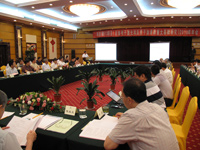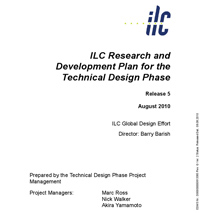Summer Challenge programme for young intelligence

Summer Challenge poster |
About 90 students from all parts of Japan gathered at the Summer Challenge programme held at KEK, Tsukuba from 21 to 29 August 2010. Starting in 2007, this programme intended for junior students who are interested in high-energy physics was the fourth in the series this year.
“The aim of the Summer Challenge programme is to encourage young students who will form the basic science for future,” said Tomiyoshi Haruyama who acts as a head of the programme. “When they were children, they must have had the experience to be surprised by a strange phenomenon they had never seen before. I want them to be surprised once again, by the frontier facilities, the experiments and realise why they like science. So, I made the theme of this year’s programme "You will be astonished, this summer".”
Read more...
-- Yu Takahashi |
 |
|
|
 |
 |
|
|
 |
| Upcoming meetings, conferences, workshops
First Baseline Assessment Workshop
KEK, Tsukuba, Japan
7-10 September 2010
XXV Linear Accelerator Conference (LINAC10)
Tsukuba, Japan
12-17 September 2010
Topical Workshop on Electronics for Particle Physics (TWEPP-10)
Aachen, Germany
20-24 September 2010
Symposium on the Superconducting Science and Technology of Ingot Niobium
Jefferson Lab, Newport News, USA
22-24 September 2010
1st International Workshop on Accelerator-Driven Sub-Critical Systems & Thorium Utilization
Virginia Tech, Blacksburg, Virginia, USA
27-29 September 2010
19th International Spin Physics Symposium (SPIN 2010)
Jülich, Germany
27 September - 2 October 2010
EUDET Annual Meeting 2010
DESY, Hamburg, Germany
29 September - 1 October 2010
Upcoming schools
Fifth International Accelerator School for Linear Colliders
Villars-sur-Ollon, Switzerland
25 October - 5 November 2010
|
|
|
GDE Meetings calendar
View complete ILC calendar
|
|
|
 |
 |
|
|
 |
Progress on China’s collaboration with XFEL and FAIR

The attendees listen to a report during the annual meeting of "Basic Research on the FEL and FAIR" project. Image: Min Zhang |
The European X-ray Free Electron Laser (European XFEL) and the Facility for Antiproton and Ion Research (FAIR) are two important international cooperative science facilities mainly led by Germany. China has participated in the R&D of some detectors, low-temperature systems, high-performance undulators, superconducting material and special material for these projects. On 29 August 2008, the project "Basic Research on the FEL and FAIR" supported by China's national programme for key basic research and development (officially called 973 programme) started. The project is coordinated by the Institute of High Energy Physics, Chinese Academy of Science (IHEP), and about ten different research institutes, universities and corporations in China participate in this project, including the Institute of Modern Physics, Peking University, Tsinghua University, Orient Tantalum Industry Corp. (OTIC), etc.
Read more...
-- Min Zhang |
 |
|
|
 |
From Physics World
1 September 2010
Three-year extension recommended for Tevatron
Fermilab's Tevatron collider looks set for a new lease on life following a campaign to keep the facility running beyond the end of 2011.
Read more... |
|
From The Guardian
27 August 2010
Cuts put Britain's science reputation on the line
Withdrawing Britain from projects such as the Large Hadron Collider is not just an economic matter – it's a people one, too.
Read more... |
|
From Gazeta
27 August 2010
Зачем Дубне коллайдер?
Что такое линейный коллайдер и зачем он нужен, если уже создан и работает БАК? Стоит ли Дубне бороться за право разместить проект на своей территории? Какие выгоды этот проект сулит нашей стране? На эти и другие вопросы отвечают в своей лекции представители Global Design Effort — международного научного сообщества, проектирующего ILC.
Read more... (in Russian) |
|
From The Guardian
26 August 2010
UK scientists on collision course over £1bn research cuts
Officials fear planned 25% cuts could jeopardise Britain's involvement in the Large Hadron Collider at Cern
Read more... |
|
From CERN Courier
24 August 2010
IPAC '10: accelerating to an international level
A new era of communication in the particle-accelerator community began in Kyoto in May, with the first in a new international series of annual particle-accelerator conferences.
Read more... |
|
|
 |
ILC R&D plan updated

ILC Research and Development Plan for the Technical Design Phase – Release 5 |
Our R&D plan has once again been updated to reflect a number of significant developments in our present four-year GDE programme. The document is entitled "ILC Research and Development Plan for the Technical Design Phase – Release 5" and we consider this plan to be a 'living' document, in the sense that we update it roughly every six months to maintain the most current description of our programme, goals and resources. Our main goal remains unchanged. It is to produce a Technical Design Report (TDR) and Project Implementation Plan (PIP) for the ILC at the end of 2012 that can be used to propose the project to governments.
Read more...
-- Barry Barish
Director's Corner Archive |
arXiv preprints
1008.5202
Scaling Law of Beam Break-Up for Single Ultrashort Bunch in RF Linac
1008.5068
Cosmic ray tests of a GEM-based TPC prototype operated in Ar-CF4-isobutane gas mixtures
|
|

